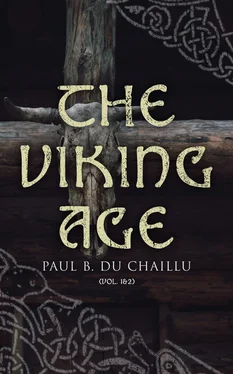While Odin, according to the sages, was in Sweden 83his son Sigrlami ruled over Gardaríki; during the life of his father or after his death he had to fight against the Jötnar, and, like Skjöld his brother, he married a daughter of King Gylfi, who ruled over the present Sweden, whose authority is made to extend to the principal islands which form part of the present Denmark.
“At this time the Asia-men and Tyrkjar came from the east and settled in the northern lands; their leader was called Odin; he had many sons, and they all became great and strong men. One of his sons was called Sigrlami; to him Odin gave the realm now called Gardaríki; he became a great chief over that land; he was handsomer than any man. He was married to Heid, the daughter of King Gylfi; they had a son called Svafrlami.” (Hervarar, c. 2).
Sigrlami fell in a fight against Thjassi the Jötun. When Svafrlami heard of his father’s death he took for himself all his realm, and became a powerful man. It is said that on one occasion when riding in a forest he chased a stag for a long time, and did not kill it until sunset, when he had ridden so far into the forest that he lost his way. He saw a large stone and two Dvergar beside it, whom he was going to sacrifice to the gods, but on their begging to be allowed to give a ransom for their lives Svafrlami asked their names. One was called Dyrin, the other Dvalin. Svafrlami at once recognised them to be the most skilful of Dvergar, and insisted upon their making a sword for him, the hilt to be of gold, and the scabbard to be ornamented and inlaid with gold. The sword was never to fail, and never to rust; to cut iron and stone as well as cloth; and it was to bring victory in all battles and duels (einvigi) to every one who carried it.
On the appointed day Svafrlami came to the rock; the Dvergar gave him the sword; but Dvalin, standing in the door of the stone, said: “Thy sword, Svafrlami, shall be a man’s bane (death) every time it is drawn; and with it shall be performed the greatest nithing’s deed; it also will be thy death.” Svafrlami then struck at the Dvergar so that both edges of the sword entered into the rock, but the Dvergar ran into the rock. Svafrlami, we are told, called the sword Tyrfing, and carried it in battles and single fights; with it he killed in a duel Thjassi the Jötun, his father’s slayer, whose daughter Frid he married” (Hervarar Saga, c. 3).
We not only have accounts of how this Odin established his family in the North, but also how he died there. Feeling that his days were coming to an end, he prepared to die on a pyre, as was the custom of those times; and we find the belief existed that after his death he returned to the old Asgard.
“Odin fell sick and died in Sweden. When he was at death’s door he let himself be marked (wounded) with a spear-point, and said he was the owner of all the men slain by weapons, and would go into Godheim (the world of the gods), and there welcome his friends. Now the Swedes thought he had gone to the old Asgard, and would live there for ever. Then there again arose worship of Odin, and vows were made to him. The Swedes often thought he appeared to them in dreams on the eve of great battles; to some he gave victory, others he invited home; either of these alternatives was considered good. After death he was burnt with great splendour. 84It was their belief that the higher the smoke rose in the air the more glorious would the burnt man be in heaven, 85and the more property that was burnt with him the wealthier would he be” (Ynglinga Saga, c. 10).
Whether a hero and leader of the name of Odin ever lived or not we cannot tell, but that we know from the records the people believed that he and the Asar had existed, and the creed they had established was their religion; and this belief lasted with many to the end of the pagan era, which did not entirely disappear till the twelfth century. Odin and some of the Asar were deified and worshipped in all the countries of the North, and with the lapse of time their fame increased.
“Odin was a mighty warrior and travelled far and wide, and became owner of many realms (countries). He was so successful that in every battle he gained the victory, and at last his men believed that in every battle victory was in his power. It was his custom, when he sent his men into fight or on other errands, first to lay his hands on their heads and give them bjanak; 86they believed that luck would then be with them. Also it happened that whenever his men were in need on land or at sea they called on his name, and always felt relieved by it; for every kind of help they looked to him. He often went so far away that he was on a journey many seasons” (Ynglinga, c. 2).
“It is said with truth that when Asa-Odin, and with him the Díar, 87came into the northern lands, they began and taught those ídróttir 88which men afterwards long practised. Odin was the foremost of them all, and from him they learned the ídróttir , for he first knew them all, and more than any other. He was highly honoured on account of the following things. He looked so fair and noble when he sat with his friends that every mind was delighted; but when he was in a host, then he looked fierce to his foes. This was because he knew the ídróttir of changing looks and shapes in any way he liked. Another of his ídróttir was that he spoke with such skill and so glibly that all who listened thought it the only truth; he always spoke in poetry (hendingar) like that which now is called skáldskap (skaldship, poetry). He and his temple-priests are called Ljódasmidir (lay-smiths, song-smiths), for that ídrótt came from them into the northern lands. Odin had power to cause his foes to grow blind or deaf or full of fear, and to make their weapons bite no more than wands (sticks of wood). His own men fought without armour madly, like dogs or wolves, bit their shields, and had the strength of a bear or bull; they cut down the foe, and neither fire nor iron hurt them. That is called berserksgang (rage or fury of Berserks)” (Ynglinga, c. 6–7).
In the poetical language of the Sagas and Eddas a very great number of figurative names are given to Odin, which show how numerous his attributes were believed to be, and many of which recall the language of Homer; among them we may mention:—
The thunderer. 89
Father of ages.
The wise walker.
The lord.
The helmet bearer.
The cheerful.
The loving one.
The high one.
The fickle.
The true-guessing one.
The evil-eyed.
The manifold.
The wise in beguiling.
The much knowing.
The father of victory.
The father of the slain.
The conqueror in fights.
The entangler.
The feared one.
The rover.
The serpent (from his being able to assume its shape).
The soother.
God of the hanged. 90
God of the ravens.
God of victory.
God of the Gautar.
The shouting god.
The one-eyed one.
The fierce one.
God of the earth.
Friend of Mimir.
The foe of the Fenrir-wolf.
The lord of the spears.
The god of hosts.
The father of all.
The wish-god.
The wind-whispering.
The burner.
The wide-ruling.
The work-skilled.
The swift-riding.
The god of battle.
The almighty god.
The host blinder.
The true one.
The long-bearded.
The god of cargoes.
The father of hosts.
The useful adviser.
The shaper of battle.
The swift rider.
“Then Thridi said: Odin is the highest and oldest of the Asar; he rules over everything, and, however mighty the other gods are, they all serve him as children a father. Frigg, his wife, knows the fates of men though she cannot prophesy. Odin is called Allfödr, because he is the father of all the gods; he is also called Valfödr, because all those who fall in battle (valr = the slain) are his chosen sons. These he places in Valhöll and Vingólf (a hall owned by the goddesses), and then they are called Einherjar. He is also called Hanga-gud (god of the hanged), Hapta-gud (god of the chained), and Farma-gud (god of cargoes), and he gave himself still more names when he was at King Geirröd’s. Gangleri said: ‘Wonderfully many names have you given to him, and surely it needs great wisdom to know the events which are the reasons of every one of these names.’ Hár answered: ‘Great wits are needed to explain this carefully, but, to tell it shortly, most of the names have been given because, as there are many different tongues in the world, every nation thinks it necessary to change his name according to their language, that they may invoke and pray to him for themselves. His journeys have given rise to some of these names, and they are told among people’ ” (Later Edda, c. 20).
Читать дальше












